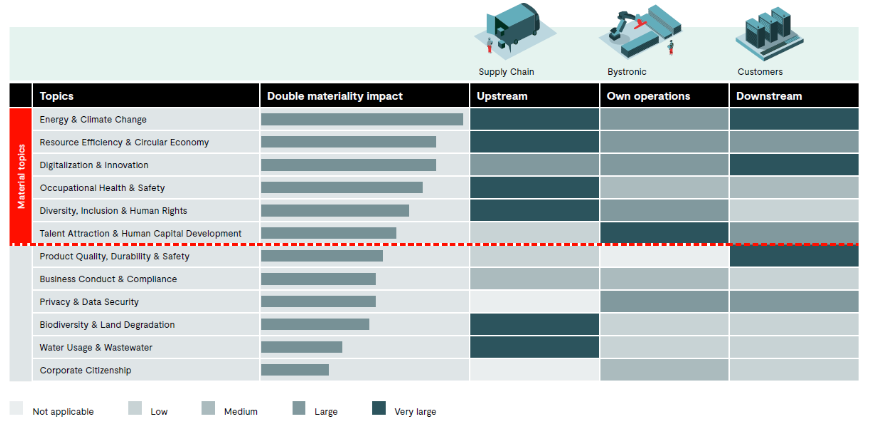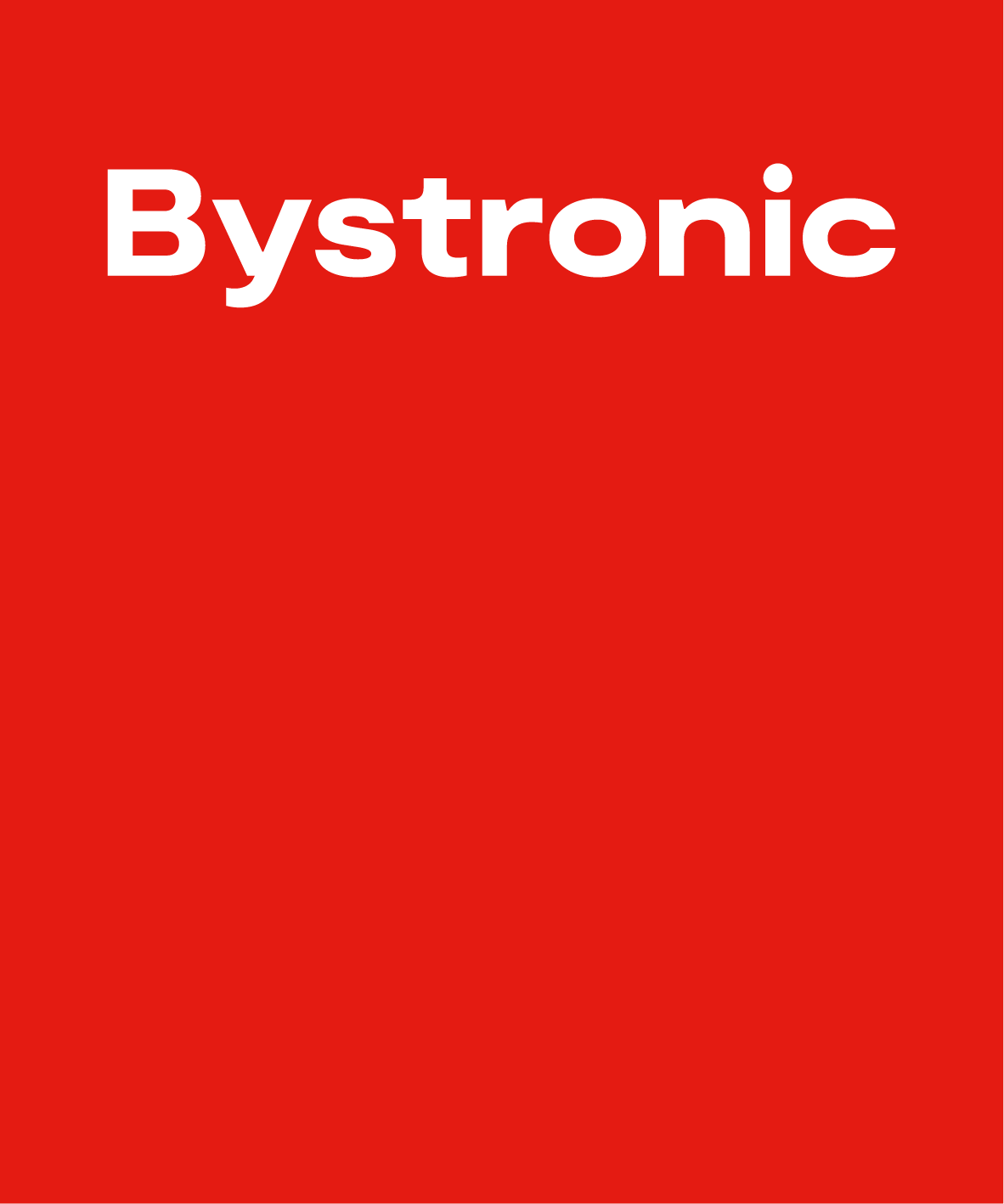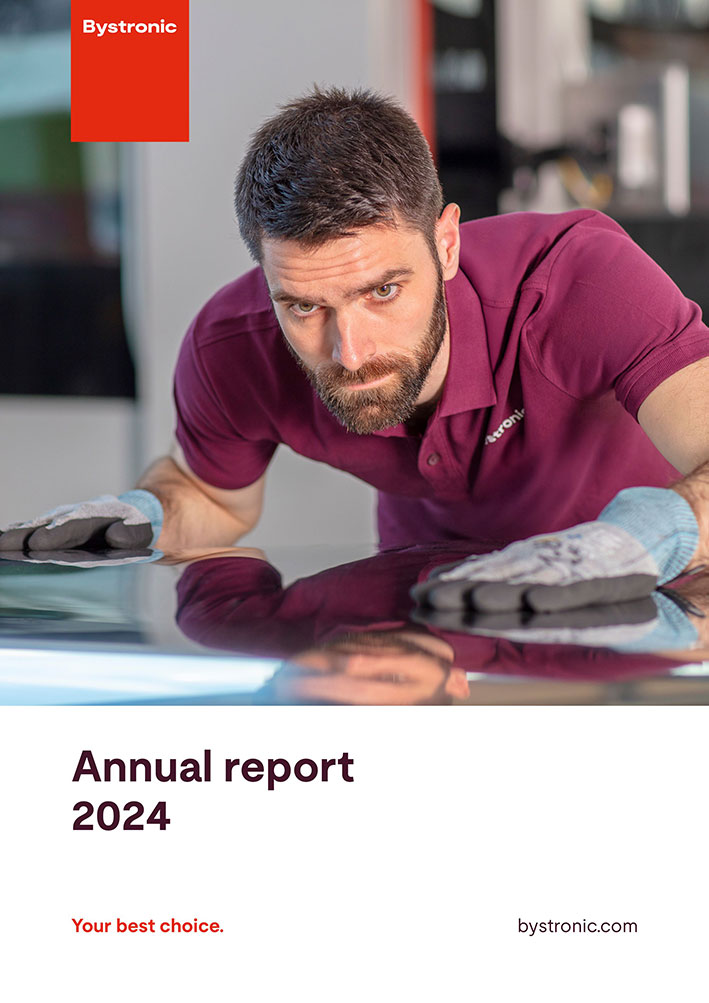Report on non- financial matters1
1 Environmental, Social and Governance (ESG) at Bystronic
1.1 Introduction
Bystronic takes a holistic approach to sustainability. ESG criteria (Environmental, Social, Governance) are an integral part of our business strategy. In line with our principle, “Creating impact for a sustainable future with sheet metal and beyond," our goal is to make sheet metal a material of the future. We want to make a decisive contribution to strengthening sustainability – for our company, our customers, the environment and our ecosystem.
We strive to lead our industry towards net zero emissions. We are working hard to improve energy and resource efficiency. We are proud that our employees propose and implement initiatives that drive our sustainability forward. We also look externally for innovative solutions and work with start-ups to make sheet metal processing more sustainable. We are exploring new possibilities, such as the use of less energy-intensive materials, and we are developing solutions to extend the service life of our products while also reducing energy requirements.
The year 2024 was an important milestone on our sustainability journey. By integrating and operationalizing ESG into all areas of our organization, we were able to make tremendous progress.
To make the most impact as fast as possible, we established five sustainability targets for the year 2030 (baseline 2021):
- 42% reduction in Scope 1 and Scope 2 emissions
- 25% reduction in Scope 3 emissions
- 25% women in management positions
- Industry leader in occupational safety (Total Recordable Injuries TRI2 ≤ 0.8)
- 20% reduction of waste
To ensure that we achieve these goals, we are managing our progress with our own ESG performance management system.
- This section of the Annual Report is intended to provide an overview of the disclosures in connection with Articles 964a –964c and 964j –964l of the Swiss CO
- Number of injuries per 100 full-time employees (100 full-time employees * 50 weeks * 8 hours * 5 days/week = 200,000 worked hours).
1.2 Highlights
In 2024, we made significant progress in our sustainability efforts. We advanced our strategy to phase out fossil fuels and we implemented a wide array of measures to improve sustainability from a social perspective:
- Further infrastructure development: At our headquarters in Niederönz (Switzerland) and in our manufacturing plants in Tianjin (China), we installed additional solar panels. We also renovated the heating system in Niederönz and installed a geothermal heating system, eliminating the need for natural gas.
- 100% solar energy in the USA as of 2025: Weʼve prepared a Power Purchase Agreement (PPA) at our manufacturing plant in Hoffman Estates (USA), ensuring that 100% of its electricity needs will be met with solar energy from 2025 onwards.
- Lighthouse program with focus on circular economy: To encourage our supply chain to adapt a circular model, we have partnered with ZHAW School of Management and Law in Switzerland and various partners in the mechanical and electrical engineering (MEM) industry in a lighthouse program. This four-year project will be supported by Innosuisse, the Swiss agency for promotion of innovation.
- Better risk management in the supply chain: We added new suppliers in the EcoVadis platform. The companies represented there now account for 20% of the total purchase value in Bystronicʼs supply chain.
- Publication of human rights policy: Bystronic reinforced in 2024 its commitment to the highest human rights standards with the publication of a human rights policy. We also established a Standard Operating Procedure (SOP) for conducting regular Human Rights Due Diligence (HRDD) risk analyses.
- Combating child labor and conflict minerals: Our Global Supply Chain department carried out risk assessments relating to child labor and conflict minerals. We also increased the share of suppliers that signed our supplier code of conduct, which was introduced in 2023.
- Certification of workplace safety: As part of our ongoing effort to improve workplace safety, our laser manufacturing site in Niederönz received ISO 45001 certification.
Our social and ecological engagement in recent years is having an impact. We are on a positive path with our 2030 sustainability goals. We were pleased to have exceeded most of our 2024 environmental targets, which was due, in part to our lower production volume.
|
STATUS ON TARGETS |
2024 targets |
Status |
2024 |
|
2023 |
|
2022 |
|
2021 |
|
|
Scope 1 & 2 -42% reduction in 2030 vs 2021 (tCO 2 e) |
10,344 |
OK |
10,127 |
|
10,510 |
|
11,413 |
|
12,028 |
|
|
Scope 3 -25% reduction in 2030 vs 2021 (tCO 2 e) |
1,446,812 |
OK |
1,015,518 |
|
1,117,132 |
|
1,391,743 |
|
1,578,340 |
|
|
25% Women in management positions in 2030 (%) |
21% |
NOK |
19% |
|
20% |
|
|
|
|
|
|
Industry leader in occupational safety (TRI ≤ 0.8) |
0.80 |
NOK |
1.59 |
|
1.94 |
|
1.40 |
|
1.59 |
|
|
20% reduction of waste in 2030 vs 2021 (tons) |
3,413 |
OK |
2,288 |
|
3,323 |
|
3,860 |
|
4,267 |
|
1.3 Sustainability strategy
Bystronicʼs sustainability strategy has been developed after conducting a comprehensive materiality and impact assessment together with our stakeholders. The resulting material topics form the three pillars of our sustainability strategy:
- Sustainable solutions
- Engaged employees
- Responsible business
1.3.1 Double materiality
Bystronicʼs impact goes far beyond our own operations and is directly tied to the operations of our suppliers and customers. Around 70% of the companyʼs value chain emissions are generated by our customersʼ use of our products. By taking the value chain into account in analyzing and evaluating key sustainability issues, Bystronic can identify a broader range of risks, impacts and opportunities.
To identify and prioritize the most critical sustainability issues, we use a double materiality assessment process, which is based on input from various stakeholders, such as industry associations, suppliers, customers, employees and investors. We engage with these stakeholder groups in a variety of ways. Internally, the Bystronic Sustainability Council connects with the Executive Board, the Board of Directors, and various corporate functions. Externally, our sales representatives interact regularly with our customers and participate in industry events.
Our Supply Chain Management team works closely with our suppliers to ensure sustainability in the supply chain. The Investor Relations function ensures we meet our shareholdersʼ expectations, engaging with them directly through multiple events, such as our Capital Markets Days. We also actively participate in associations to connect with other companies and to drive change throughout the entire industry.
The following topics have been identified as material:
- Energy and climate change
- Resource efficiency and the circular economy
- Digitalization and innovation
- Occupational health and safety in the workplace
- Diversity, inclusion and human rights
- Talent attraction and human capital development

1.3.2 Sustainability governance
We recognize that effective governance is crucial to achieving our 2030 sustainability mid-term targets. Since the start of our sustainability journey in 2021, the company has been taking steps to continuously improve our approach to governance.
Bystronic has set specific goals and established corporate policies. Our sustainability disclosures are based on the reporting frameworks Global Reporting Initiative (GRI),3 Carbon Disclosure Project (CDP)4 and the Swiss climate ordinance.5
Sustainability cascades throughout all levels of the organization, from the CEO to the ESG Officer and the Sustainability Council, all the way to the corporate functions and plant managers that coordinate sustainability initiatives at the operational level. The rolls are divided as follows:
- The Board of Directors is responsible for the supervision and control of the Group and its management and monitors compliance with regulations. This includes oversight of risks and opportunities, including climate-related topics. The Board determines the Groupʼs strategic targets and the financial and human resources necessary to achieve those targets. Additionally, the Board reviews the strategy and goals in the context of sustainability. The Board is also responsible for the review and approval of reported information (incl. material topics) and is informed in writing and verbally of the companyʼs strategies, plans and results. This includes regular updates on sustainability improvements. At least one Board member is closely involved in all sustainability matters via regular dialogue with the ESG Officer. At least two Board members are also members of Boards of other companies with long-standing experience in sustainability and climate target setting.
- The CEO is the driving force behind Bystronicʼs integrated sustainability strategy and is deeply committed to all climate change and social issues.
- The ESG Officer oversees sustainability issues, including climate-related activities, and coordinates the overall sustainability strategy and implementation of action plans with various corporate functions.
- The Sustainability Council implements Bystronicʼs integrated sustainability strategy.
- Global Reporting Initiative: https://www.globalreporting.org/
- Carbon Disclosure Project: https://www.cdp.net/en
- Swiss Ordinance on Climate Disclosures: https://www.fedlex.admin.ch/eli/oc/2022/747/de (German)


